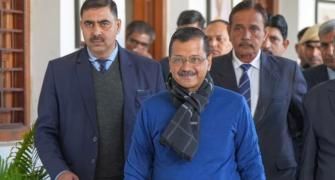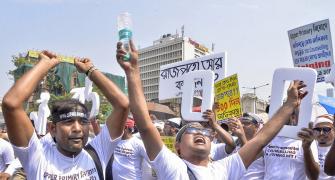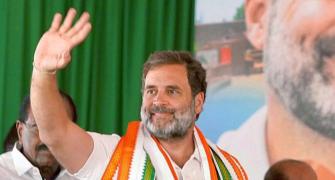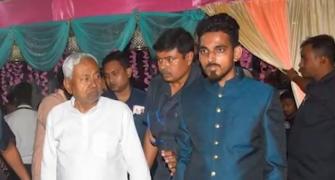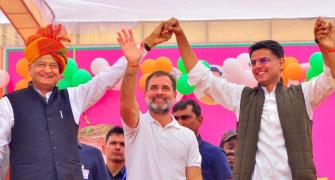As the second Hamid Karzai government settles down to business in Afghanistan, India must seriously focus on long-term intervention and assistance in stabilising one of its most important neighbours, a variety of Afghan and Indian politicians, analysts and diplomats said in Kabul and New Delhi.
As the sixth largest international donor to Afghanistan, India's $1.2 billion aid pledge so far -- of which nearly $845 million has been committed to specific projects -- means that India remains a "benign and much sought-after presence", especially when compared to Pakistan, whose intelligence agencies and army is still seen as playing a "double game with the Taliban," one Afghan analyst said on condition of anonymity.
But interviews with a cross-section of the Afghan leadership in Kabul, ranging from Afghan National Army Chief Bismillah Khan to Afghan Foreign Minister Rangin Dafdar Spanta to Karzai's presidential challenger Abdullah Abdullah revealed one common factor : The Afghan leadership would like India to raise its profile in Afghanistan.
According to a former UN official in Kabul, responsible for coordinating foreign aid with the Afghan government, "India believes it is the largest power in the region and must therefore play a role commensurate with its size. But in Afghanistan, India is seriously punching below its weight."
As India returned to Afghanistan after a gap of nearly two decades in December 2001, soon after the Taliban fled, it deliberately chose a low profile, in deference to US sensitivities towards Pakistan's articulated need to continue to play a primary role in Afghanistan.
Besides Kabul, India opened consulates in Herat, Jalalabad, Kandahar and Mazar-i-Sharif, but a combination of issues -- the Taliban scare in southern Afghanistan as well as the lack of political, diplomatic and bureaucratic interest in Delhi -- meant that the size of these missions remained small.
Even the Indian embassy in Kabul, which has been subject to two bomb attacks in the last two years -- proving that terrorist groups like the Sirajuddin Haqqani faction of the Afghan Taliban and the Lashkar-e-Tayiba, said to be responsible for the two blasts respectively, believe it is important to scare India into reducing its presence -- has less than a dozen officers dealing with all areas of the bilateral relationship, including political affairs, economic aid, consular affairs and security issues.
In comparison, the US mission in Kabul, along with USAID, is said to employ about 1,000 people in Kabul, the UK's mission, along with its aid arm, DFID, employs about 400 diplomats and aid consultants, while Japan's International Cooperation Agency, the aid instrument of the Japanese government, brought its numbers down to 50 from about 90 people after the bombing of the UN guest house in Kabul 3 months ago.
In sharp contrast, the Indian embassy in Kabul has one officer dealing with aid assistance.
According to Afghanistan's ministry of finance, the US is the top donor to Afghanistan, with $31.6 billion pledged for the period 2002-13, followed by Japan with $6.9 billion (including $5 billion pledged last month), followed by the UK with $2.89 billion, European Union ($1.76 billion). Canada ($1.67 billion), India ($1.2 billion) and Germany ($1.18 billion).
Australia, with $369 million in development aid is way below the list, as is China with $196.50 million and France with $151.80 million. Even the Islamic Development Bank's assistance is a meagre $70 million, while the World Bank's aid stands at $2.8 billion and the Asian Development Bank at $2.2 billion.
India's major aid projects in the first Karzai administration included the building of the 228-km Zaranj-Delaram highway in southern Afghanistan and electrical transmission lines from the Uzbekistan border in the north to Kabul. Over the next five years, say diplomats, India is expected to focus on building Afghanistan's parliament in Kabul, as well as the run-of-the-river Salma dam in western Afghanistan.
But both Afghan and Indian analysts agree that unless Delhi expands its presence in terms of diplomats, aid workers, NGOs on the ground, or even training Afghan police and army officers in India, Delhi's strategic ambitions in 'inner Asia' will be limited to the paper they are written on.
Afghan Foreign Minister Rangin Dafdar Spanta, even as he waxed eloquent about India "being a role model for the Saarc region," which had also been a "major contributor to building infrastructure in Afghanistan," admitted after some persuasion that "India should be more active in international conferences, so that the world hears its point of view".
Spanta was only articulating a common string of conversation inside the Afghan government, to do with the "glaring absence of India." At the Bonn conference on Afghanistan in December 2001, when the world carved up responsibilities for Afghanistan, India was represented by one former diplomat, former ambassador to Russia and Pakistan, Satinder Lambah.
But over the years, as economic policy-making in the Karzai government has grown, "India has simply not kept pace with the changes nor understood that it is simply not enough to deal with individual ministers," an Afghan expert said. He pointed out the Afghanistan Compact in 2006 and the Afghanistan National Development Strategy in 2008 provided the basis and the mechanism for delivering foreign assistance, but that India was somehow unable to align itself with Afghan national strategies.
Indian diplomats argued on condition of anonymity that India, like the US and Japan, preferred to deliver aid directly so that it could better control the monies and ensure that it wasn't lost in corruption or translation.
But the Afghan expert pointed out that for India to multiply its presence, it was necessary to work in tandem with the Afghan government, especially in areas like health, community-based development and micro-finance areas which the World Bank had confirmed were high on efficiency.
For that, he pointed out, Delhi needed to realise the "heroic and even superhuman work" of the handful of Indian diplomats, staff and aid workers in Afghanistan was simply not enough.
Moreover, with the US and Nato troops expected to leave 18 months from now, the Afghan analyst said, the big powers would need to start thinking in terms of a "regional solution" to Afghanistan's continuing crises.
"If India is in Afghanistan for the long haul, then it must enhance its own presence here. Or it must work with other big players like the US or UK, and of course in conjunction with the Afghans, to do so," the Afghan expert said.


